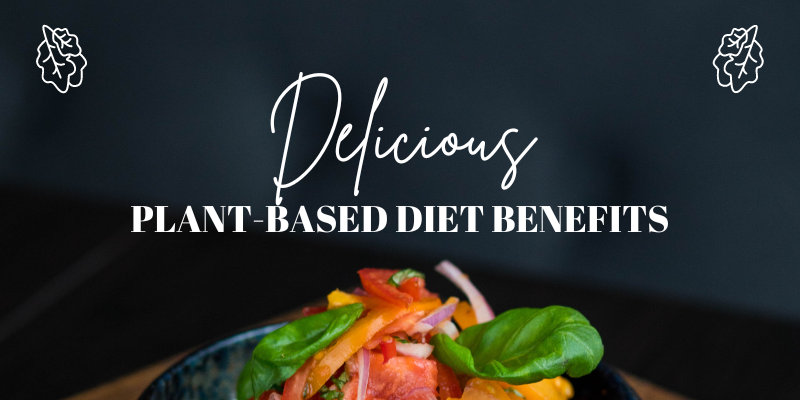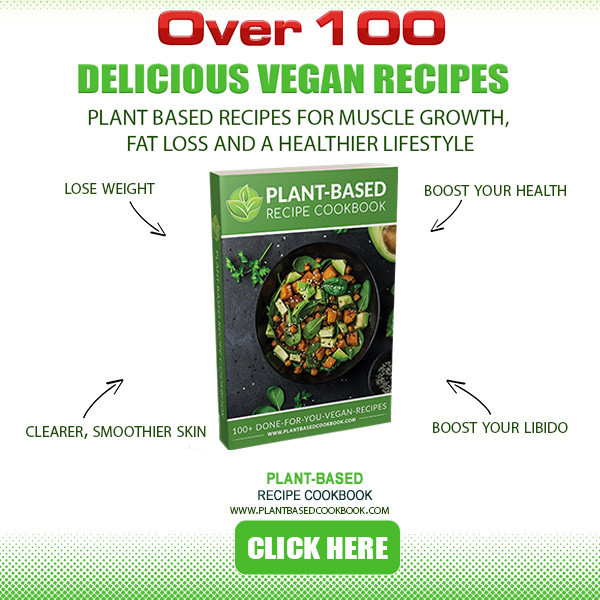Plant-Based Diet Benefits: 10 Reasons to Make the Switch

Introduction
There has been a lot of buzz surrounding plant-based diet benefits lately, and for good reason. Many studies have shown that adopting a plant-based diet can have numerous benefits for your health and the environment. In this article, we will explore 10 reasons why you should consider making the switch to a plant-based diet.
1. Reduced Risk of Chronic Diseases
Switching to a plant-based diet can have numerous benefits, including a reduced risk of chronic diseases. Studies have shown that following a plant-based diet can lead to a lower incidence of heart disease, stroke, high blood pressure, and type 2 diabetes. Some of the reasons for this reduced risk include:
- Plant-based diets tend to be high in fiber, which can help lower cholesterol levels and improve heart health.
- Plant-based diets are typically lower in saturated fat and higher in unsaturated fats, which can help lower blood pressure and reduce the risk of heart disease.
- Plant-based diets are rich in antioxidants, which can help protect against cellular damage and inflammation that contribute to chronic diseases.
By incorporating more plant-based foods into your diet, you can reduce your risk of chronic diseases and improve your overall health.
2. Weight Loss
One of the most well-known benefits of a plant-based diet is weight loss. Plant-based diets are often lower in calories and fat than diets that include animal products, which can lead to weight loss over time. Additionally, plant-based diets are typically high in fiber, which helps to promote feelings of fullness and can reduce overall calorie intake.
Studies have shown that individuals who follow a plant-based diet tend to have lower body mass indexes (BMI’s) and lower rates of obesity compared to those who consume a more animal-based diet. However, it’s important to note that weight loss is not guaranteed with a plant-based diet, and it’s still important to pay attention to overall calorie intake and portion sizes.
3. Improved Digestion
Plant-based diets have been linked to numerous health benefits, including improved digestion. Since plant-based foods are high in fiber, they can help regulate bowel movements and prevent constipation. Additionally, plant-based diets are typically lower in fat and cholesterol, which can reduce the risk of developing digestive issues such as acid reflux, ulcers, and inflammatory bowel disease. By incorporating more plant-based foods into your diet, you may also experience increased energy levels and a more positive mood, which can further improve your overall digestive health.
>>> Get your Plant-Based recipe book today and enjoy over 100 vegan recipes
4. Lower Environmental Impact
One significant benefit of a plant-based diet is its lower environmental impact. Animal agriculture is a significant contributor to greenhouse gas emissions, deforestation, and water pollution. Choosing plant-based foods instead of animal products can help reduce your carbon footprint and preserve natural resources. By eating a plant-based diet, you are not only benefiting your health but also doing your part to protect the planet for future generations.
5. Reduced Inflammation
One of the benefits of a plant-based diet is reduced inflammation. Animal products such as meat and dairy are known to be pro-inflammatory, meaning they can cause inflammation in the body. On the other hand, plant-based foods are typically anti-inflammatory and can help reduce inflammation in the body.
By reducing inflammation, a plant-based diet can help reduce the risk of chronic diseases such as heart disease, diabetes, and certain types of cancer. Additionally, reduced inflammation can lead to improved recovery after workouts and reduced muscle soreness.
6. Lower Risk of Foodborne Illnesses
One significant benefit of a plant-based diet is a lower risk of foodborne illnesses. Plant-based diets are generally safer in terms of food safety because they eliminate the risk of consuming meat, which can be a common source of foodborne pathogens such as E. coli and salmonella. In contrast, plant-based diets offer a wealth of nutrients and fiber that can help strengthen the immune system and promote overall health. Here are some key points to consider:
- Consuming a variety of fruits, vegetables, whole grains, and legumes can provide the body with essential vitamins, minerals, and nutrients.
- Plant-based foods are generally lower in fat and calories, which can help reduce the risk of chronic diseases such as heart disease and diabetes.
- A diet rich in plant-based foods can also help regulate blood sugar levels and improve gut health.
- By reducing the intake of meat and animal products, individuals can also help reduce their environmental impact and promote sustainability.
7. Better Mental Health
Switching to a plant-based diet can also have a positive impact on mental health. Studies have shown that people who consume more fruits and vegetables have a lower risk of depression and anxiety. Additionally, plant-based diets are typically rich in nutrients that are important for brain health, such as vitamin B6 and folate.
In contrast, diets high in processed and sugary foods have been linked to a higher risk of mental health issues. By adopting a plant-based diet, individuals may experience improved mood, better sleep, and increased overall well-being.
8. Lower Healthcare Costs
Adopting a plant-based diet can lead to lower healthcare costs in the long run. Studies have shown that a plant-based diet can help prevent and manage chronic diseases such as heart disease, type 2 diabetes, and certain cancers. By reducing your risk of these conditions, you may be able to avoid costly medical bills and medications.
Additionally, plant-based diets are typically lower in saturated and trans fats, which are linked to an increased risk of heart disease and other health issues. By reducing your intake of these unhealthy fats, you may also lower your risk of developing related health problems and avoid the associated medical expenses.
9. Better Athletic Performance
A plant-based diet has been shown to improve athletic performance. By consuming a diet high in complex carbohydrates, athletes can provide their bodies with the long-lasting energy they need for workouts and competitions. Additionally, plant-based diets are typically lower in inflammatory foods that can hinder recovery.
This means that athletes who switch to a plant-based diet may experience reduced muscle soreness and faster recovery times. Many professional athletes have adopted plant-based diets and reported improvements in their performance, including increased stamina, endurance, and strength.
10. Ethical Considerations
Ethical considerations are an important aspect to consider when making the switch to a plant-based diet. Many individuals choose a plant-based diet for ethical reasons, such as concerns about animal welfare and the environmental impact of animal agriculture. By eliminating animal products from their diet, individuals can reduce their contribution to animal suffering and help reduce greenhouse gas emissions, land use, and water consumption associated with animal agriculture. Additionally, choosing plant-based alternatives can help support more sustainable and ethical farming practices.
Is a Plant-Based Diet Actually Healthy?

What Is The Downside Of A Plant-Based Diet?
While plant-based diets offer numerous benefits, there are a few potential downsides to consider. Some of the drawbacks of a plant-based diet include:
- It may be more difficult to get enough vitamin B12, which is primarily found in animal products.
- Plant-based diets can sometimes be lacking in certain essential nutrients, such as iron, zinc, and calcium. However, with proper planning and attention to nutrient intake, these deficiencies can be avoided.
- Depending on the specific plant-based foods consumed, a plant-based diet may be high in carbohydrates and low in protein. This can be problematic for those with certain health conditions, such as diabetes, or for athletes and others with high protein needs. Again, with proper planning, this can be mitigated.
It’s important to note that these potential downsides can be addressed with careful attention to nutrient intake and food choices. Additionally, the benefits of a plant-based diet often far outweigh any potential drawbacks.
How Quickly Do You See Benefits Of Plant-Based Diet?
What Are The Benefits Of Not Eating Meat For a Month?
Frequently Asked Questions
Q: Is a plant-based diet suitable for athletes?
A: Yes, many athletes have adopted plant-based diets to improve their performance. Plant-based diets are typically high in complex carbohydrates, which provide long-lasting energy for workouts and competitions. Additionally, plant-based diets are typically lower in inflammatory foods that can hinder recovery.
Q: Will I get enough protein on a plant-based diet?
A: Yes, it is possible to get enough protein on a plant-based diet. Many plant-based foods such as beans, lentils, tofu, and tempeh are excellent sources of protein. Additionally, whole grains, nuts, and seeds also provide protein.
Q: Is a plant-based diet more expensive than a meat-based diet?
A: Not necessarily. Plant-based diets can be more affordable than meat-based diets, as plant-based proteins such as beans and lentils are often less expensive than meat. However, if you rely heavily on processed or specialty plant-based foods, your grocery bill may be higher.
Q: Will I be able to eat out on a plant-based diet?
A: Yes, many restaurants offer plant-based options. However, it may be more challenging to find options at some restaurants, particularly fast-food chains. It may be helpful to research menus ahead of time or call ahead to ask about plant-based options.
Q: Will a plant-based diet be too restrictive?
A: Not necessarily. While a plant-based diet does involve eliminating animal products, there are still many delicious and satisfying plant-based foods to enjoy. Additionally, there are many resources available, such as cookbooks and online recipes, to help you create delicious plant-based meals.
Conclusion
In conclusion, the benefits of a plant-based diet are numerous and compelling, from improved health to reduced environmental impact. Going meatless for even just a month can be a great way to explore these benefits and make positive changes in your life. Whether you’re looking to improve your own health, reduce your carbon footprint, or support animal welfare, a plant-based diet is a powerful tool for achieving these goals.
If you’re interested in trying out plant-based eating, we highly recommend checking out the Vegan Recipes cookbook. With over 100 delicious and nutritious plant-based recipes, this cookbook is a great resource for anyone looking to explore the world of vegan cooking. From savory soups and stews to indulgent desserts, there’s something for everyone in this cookbook. So why not give it a try and see just how delicious and satisfying plant-based eating can be?



